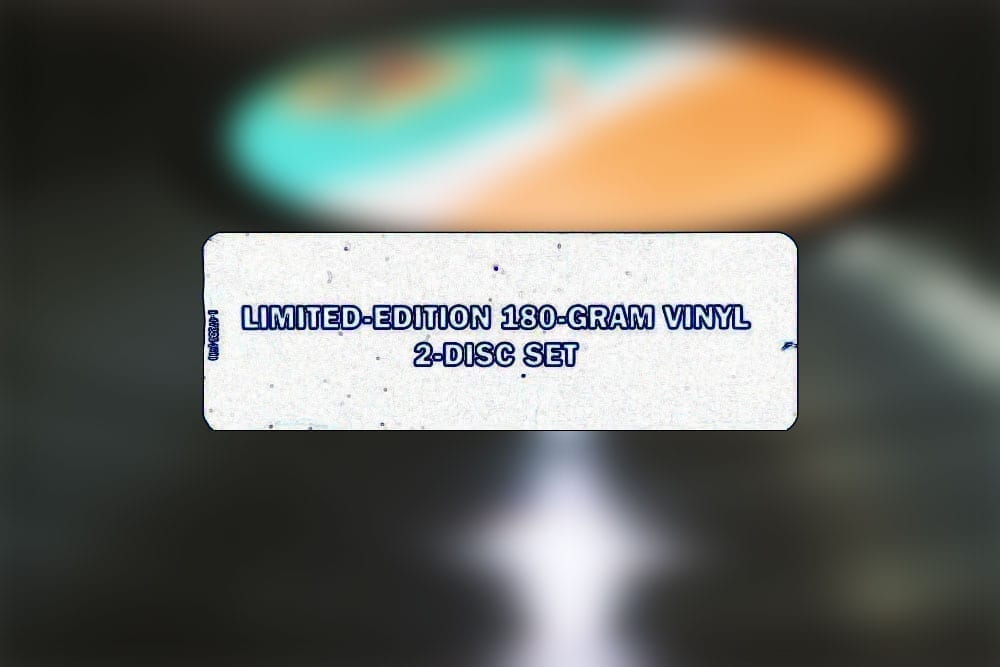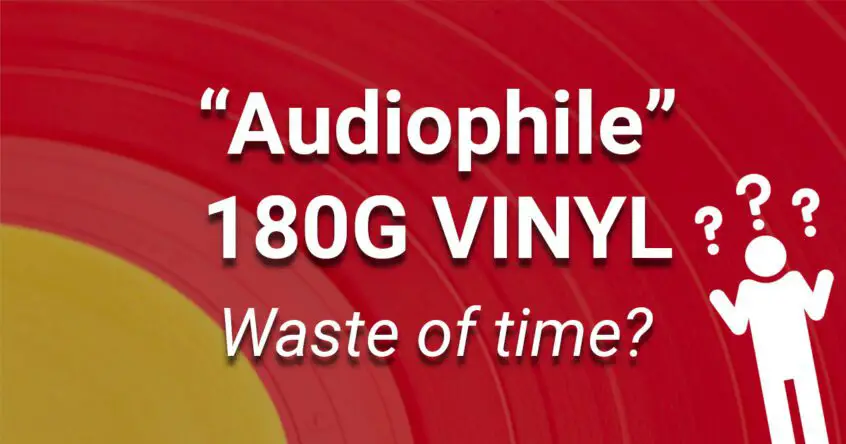Most vintage vinyl records measure somewhere between 120-150g, and for many years, these specifications seemed to work just fine. In more recent years, however, we’re commonly sold much heavier new pressings, often labeled as “Audiophile Quality 180g”.
So does 180g vinyl sound better or make any difference to the overall listening experience? Or is it all a great swindle set up by record companies?
What is 180 Gram Audiophile Vinyl?
Quite simply, 180 gram vinyl records are thicker, heavier records than the standard 120 – 150g pressings that were common throughout the 20th century. Vinyl thickness, however, is by no means capped at 180, and we are now seeing records pressed on vinyl as thick and heavy as 200g!
Does 180 Gram Vinyl Sound Better?
You’ll often hear folks claim that heavier weight vinyl allows for deeper grooves and more “detail,” but in reality, the technical standards for cutting grooves to vinyl master discs are exactly the same for all records regardless of weight.
Therefore, the weight of a vinyl record has little to no impact on sound quality; the cut grooves are determined at the mastering stage, not by the record weight.
In fact, the standard grooves cut into a piece of vinyl are so small that it’s likely you could successfully press a perfectly good record at 100g (or even lower). The record would feel like a flimsy piece of sh*t, but hey, technically, it would play and sound just fine.
When all is said and done, it’s the source music material – alongside the mastering and manufacturing process – that truly affects sound quality. The impact of vinyl weight (in comparison) is negligible.
The Benefits of 180 Gram Vinyl Records
Having said all of the above, there are still many benefits to heavier weight vinyl records – here are some considerations.
180g Vinyl is More Durable
Increased durability is perhaps the most obvious benefit of heavyweight vinyl. By durability, I mean the improved resistance to breakage or warping over time; the grooves themselves are in no way more enduring.
Heavy Vinyl Feels Nicer
Anyone who’s ever held a new 180g vinyl record will know what I mean about the imposing weight that gives a reassuring impression of quality.
Decreased Wow & Flutter
Some pressing plants believe the larger mass of thicker records can help reduce wow & flutter as they enable the platter to move at a more constant speed. However, the plant linked above are quick to add the following caveat: “…on low-end turntables, the added weight can cause extra pressure and friction on the platter.”
Better Isolation
Thicker records naturally improve isolation to protect your stylus from vibration interference; you could just purchase a cork slip mat, of course, but all the same, increased disc weight should help absorb some vibrations.
A note on VTA: When playing 180g vinyl, it’s worth considering your VTA (Vertical Tracking Angle) – particularly if you have a nice thick cork mat – as the raised height can throw off your VTA setup, resulting in poor cartridge alignment.

Is 180 Gram Vinyl Worth It? The Bottom Line:
If you’re looking for sonic nirvana in a slightly thicker record, you’re likely to be disappointed. Ultimately, the quality of the source material, alongside careful maintenance and setup of your turntable and records is what will ultimately have the greatest bearing on sound quality.
And while it’s true that 180g pressings were historically associated with higher quality standards throughout the mastering and production process, the weight of the record itself says more about where they’re trying to position vinyl records in the market than anything else.
Pretty much all new records are 180g these days, and while this trend represents a quality standard that I welcome, it does lead to some presumptions of better quality that aren’t always true.
The issue is particularly noticeable with the re-issue of classic albums on vinyl. Just like remastered CD’s, there’s a pretty noticeable push from big record labels to re-sell their back-catalogue on vinyl under the pretence of “improved quality.”
You could argue that 180g pressings are just part of an overall veneer designed to persuade affluent consumers they should invest in yet another copy of that classic Beatles album.
This spectacle alone would be fine if you could be confident of improved (or at least faithfully re-created) sound quality.
However, sadly, this is not always the case. Record companies are notoriously illusory when it comes to stating specific details of source material used to create re-issues and compilations. There’s a general feeling among many collectors that, in some cases, record companies have gone as far as to cynically release vinyl records using CD files as source material.
Whether this is true or not, record companies should always strive to use the best source material possible when pressing a vinyl record. Quite simply, anything less than the best available source is a cynical attempt to swindle the record buying public.
Considering the above, it’s best to take that 180g sticker with a pinch of salt. Spend some time researching the quality of a pressing before committing to purchase (if you can).
Discogs has a wealth of information; also, online forums such as stevehoffman.tv are a good source for listener opinions. Purchase the best copy you can afford (or find), and if that happens to be a 180g pressing – think of it as a nice bonus.




I still believe records& CDs are both recorded at same time and lps are just CDs on vinyl listen to inxs kick on cd then vinyl this is was late 80s you couldn’t buy it on vinyl
I know I. prefured albums then but CDs were near indestructible ill’ be 60 in a couple months and and I know newer music belongs to CDs
I believe the biggest problem with collecting records is the storage issues that come with them. More especially when your collection starts bursting at the seams.
I for one would love to get away from the 180g records and come back to the old style 120g vinyl.
Not only does the accumulative effect of 180g vinyl take up more space it also adds unnecessary weight to the collection.
Rant over 🙂
It’s nice to see a “complete” discussion of 180g vinyl. As with many things in life, there are some pros and some cons. Each listener can make their own decision. However, I am firmly in the camp of those who feel that the heavier weight does NOT materially affect the quality of the sound. Thanks for a good discussion on this topic (as is the case with all of your articles — keep up the good work. It is much appreciated.)
I have noticed no improvement in sound with 180 g vinyl, however I like the feel of the 180g better.
Thanks for the article, great information. Several new vinyl I’ve purchased lately has been 180g and I was curious to the purpose, quality, etc.
Frank, thanks for your comments on vinyl mats, very helpful!
Cheers all!
I too think that the 180-gram vinyl benefit is over exaggerated, but I’m sure it helps in the areas you all said where it’s beneficial.
I personally don’t like cork mats anymore since going to an acrylic mat, going to the acrylic mat made the biggest difference on my turntable than anything I tried, except for the cartridge of course; but adding stuff like extra weight to the record did absolutely nothing to improve the sound; nor did isolation feet really, those did take out a bit of rumble at high volumes but nothing major; but the acrylic mat made a noticeable difference, and was superior over any rubber, cork, or leather mat I tried…in my opinion of course.
The only issue with acrylic mats is that they are on the slippery side, which when I first tried cleaning a record with a record cleaning brush the record slipped on the mat, so I have put far less downward force on the brush than I had to with other mats, a small problem I’m willing to sacrifice for the better sound I get.
Exactly. Surely it doesn`t matter how “heavy” a record is if the original production was crappy in the first place. I got “Safe As Milk” on 180g vinyl and it sounded just as bad (production-wise) as my original copy purchased back in 1968! I suppose that a weighty vinyl record would just give the illusion of sounding better.
I believe everything you wrote here about the 180 graham vinyl to be true. I will tell you this as a record collector & audiophile (or audiofool you be the judge )for over 40 years I have come across some of those flimsy thin dynaflex pressings that were pure sonic bliss to my ears, so yes the 180grahm press sounding better is complete nonsense
Just wondered who “Graham” was. Don`t mean to be facetious!
Just compare with.a flexible disc. The advantage of a gradual weight increase will soon become clearer.
Damn! I was hoping you would say fat records are much better.
Don’t fret older recordings have distinct octives surpassed only slightly by digital remasters zeppelin 3 is a perfect example Page couldn’t get over being one upped by jones on celebration day
[…] often receive a digital download card to accompany your record. And, most releases are pressed on 180g heavy-weight vinyl, which is thicker than your typical vintage record at 120 – 160g. The added thickness has no real […]
There are two , possibly three huge elephants in the room with 180 gram vinyl this article doesn’t address ..
1 . Price : using more vinyl will increase the price .They are pretty expensive .
2. Not exactly so important (but important enough to many ) sense memory feel …They don’t feel like the records we remember …The sense of nostalgia is gone as if we’re holding a ‘Fake’ copy of what we once owned . When you hold it and flip it over it just doesn’t feel the same ..at the store you want to look at both the front and back and the extra weight is a turnoff along with the price . 120/130/140 weight would be just fine for durability ..Those 60’s 70s records have held up well . Heaven forbid you want to move them frequently . If there’s no sound
difference it really makes no sense except to drive up the price and leave out those who can’t afford them. …
3. Unless you have a top end turntable your going to wear out your belt pretty quickly and some records already sound a bit draggy on my turntable ..And I have a screw drive. .180 Happy Jack album by the Who sounds awful , almost like it’s not them . Played an old copy and it sounds just fine
Excuse me , ‘ direct drive’ for those who didn’t know what I meant